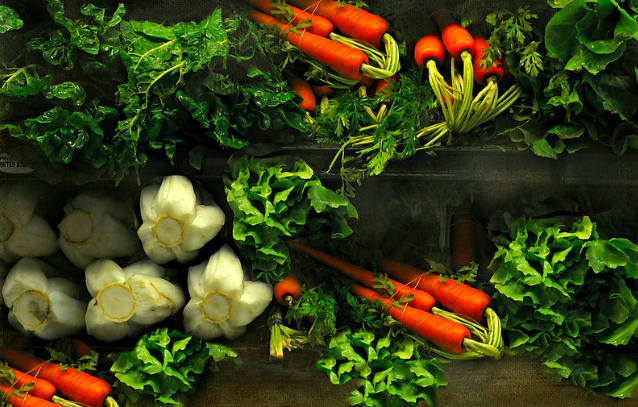Mountain View Farm aids food bank produce
It’s late March and the tractors at Mountain View Farm sit waiting to plow fields still covered by a thin layer of snow and ice. But inside two long greenhouses, Easthampton farmers Liz Adler and Ben Perrault are busy at work, starting seeds in preparation for a growing season that they hope will produce 100,000 pounds of produce for the Food Bank of Western Massachusetts (FBWM).
“Usually by this time we have the ground tilled and are just about ready to plant,” Adler said smiling next to a plot designated to grow herbs, some of which will find their way to food insecure families right here in the valley.
A person is considered food insecure when they don’t know when, or from where, their next meal will come. Facing economic hardship, some families are forced to slash food spending in order to pay the rent or heat bill. According to food bank data, food insecurity rates in the pioneer valley have risen every year since 2006 and today it is estimated that 15,000 people receive food assistance every week in Western Massachusetts alone. In total, the food bank distributes around eight million pounds of food annually.
Jerod Shuford, Education Coordinator for the FBWM, said that the food bank relies on the efforts of federal, state and local agencies to meet the growing needs of the community. One of the most important local partners is Mountain View Farm.
“Farmers are a huge part of the community, and they have been super generous.” Shuford said.
On the farm, Adler introduced me to her husband, Ben Perrault and farm workers Annika La Fave and Hannah Doubleday, who were all busy transplanting tiny bright green seedlings inside two greenhouses full of sprouting leeks, lettuce and herbs—the product of hours of tedious work.
“Eight people worked for 16 hours to fill this greenhouse,” Perrault told me, his hands busy pressing soil around the roots of fragile seedlings.
Once the ground thaws, the plants will go into the soil and the farmers will start filling the greenhouses again. It’s a lot of work, but they were happy to do it.
“I think it’s an important thing that the food bank does. I like the partnership we have,” Adler said.
In exchange for the produce that Adler and Perrault grow, they get the rights to work on about 60 acres of land in Hadley that is owned by the food bank.
But, despite receiving millions of pounds of food and state funding, the food bank had trouble fulfilling the need for food assistance in 2012 citing growing food insecurity, rising food costs and decreased funding to charitable programs.
“We do have to place limits on how much they can get per visit because there is always a greater need than we can fill.” Shuford said.
The FBWM, one of four in the state, distributes food to front-line food providers like shelters and food pantries in Berkshire, Hampshire, Hampden and Franklin counties.
To help underserved populations living in virtual food deserts, the FBWM operates a mobile food bank that brings non-perishables to people with limited access to healthy food supplies from grocery stores or farmers markets.
With few options, the food insecure population tend to shop at convenience stores where they purchase cheap, calorie-dense foods that are highly processed and unhealthy.
“They’re getting three meals a day, but they’re usually not nutritional meals because their food budget is so tight that they’re not able to buy fresh fruits and vegetables,” Shuford said.
The farm helps address the nutritional issues facing low income families in the community by cultivating an assortment of chemical-free produce ranging from celery to strawberries. The same food sold through the farms community-supported agriculture (CSA) program goes to the food bank to feed those in need.
“All the stuff we give them is marketable produce,” Perrault said.
Rural Easthampton may be far away from the neighborhoods hit hardest by the fledgling economy, but by caring for the community, the workers at Mountain View Farm are cultivating more than just vegetables.
Jason Kotoch can be reached at jasonkotoch@gmail.com






